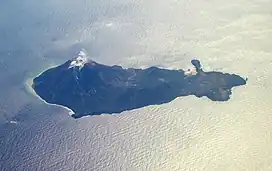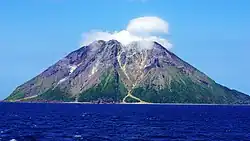| Mount Iō | |
|---|---|
| 硫黄岳 | |
 Aerial view of Iōjima with Mount Iō steaming.(February 2008) | |
| Highest point | |
| Elevation | 703.7 m (2,309 ft)[1] |
| Prominence | 704 m (2,310 ft) |
| Listing | List of mountains and hills of Japan by height |
| Coordinates | 30°47′35″N 130°18′19″E / 30.79306°N 130.30528°E[1] |
| Naming | |
| English translation | Sulphur Mountain |
| Language of name | Japanese |
| Geography | |
| Location | Iōjima, Kagoshima Prefecture, Japan |
| Parent range | Kikai Caldera |
| Topo map | Geographical Survey Institute, 25000:1 薩摩硫黄島, 50000:1 開聞岳 |
| Geology | |
| Age of rock | Holocene |
| Mountain type | Stratovolcano |
| Volcanic arc/belt | Ryukyu arc |
| Last eruption | June 2013 |

Mount Iō. May, 2015. Taken from the east.
Mount Iō (硫黄岳, Iō-dake) also Mount Iwo is an active rhyolitic lava dome on Iōjima in Kagoshima Prefecture, Japan. It sits within the borders of the town of Mishima.
The mountain is made up of non-alkali felsic rock and pyroclasitic flows.[2]
References
- 1 2 Geographical Survey Institute map 25000:1 薩摩硫黄島, last access 9 January 2009
- ↑ "Kyushu". Seamless Digital Geographical Map of Japan. Geological Survey of Japan AIST. 2007. Retrieved 2009-01-13.
- VolcanoWorld - Kikai, Kyūshū, Japan
- S. Hamasaki, Volcanic-related alteration and geochemistry of Iwodake volcano, Satsuma-Iwojima, Kyushu, SW Japan, Earth Planets Space, pp 217–229, 2002, Tsukuba, Research Center for Deep Geological Environments, Geological Survey of Japan, AIST,
External links
- Satsuma-Iojima - Japan Meteorological Agency (in Japanese)
- "Satsuma-Iojima: National catalogue of the active volcanoes in Japan" (PDF). - Japan Meteorological Agency
- Satsuma-iojima - Geological Survey of Japan
- Kikai - Geological Survey of Japan
- "Kikai". Global Volcanism Program. Smithsonian Institution. Retrieved 2021-06-24.
This article is issued from Wikipedia. The text is licensed under Creative Commons - Attribution - Sharealike. Additional terms may apply for the media files.